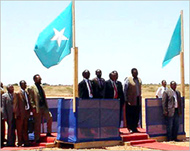Somali president lands in Djibouti
The transitional president of Somalia has landed in Djibouti, after leaving Kenya for his home country.

After a lavish send-off ceremony hosted by Kenyan leader Mwai Kibaki, Somali president Abdullahi Yusuf Ahmed boarded a plane on Monday for Somalia but overflew his home country.
An AFP correspondent in Djibouti confirmed Yusuf’s arrival there, which Somali officials in Nairobi explained as a technical mishap.
The officials blamed darkness and a lack of facilities at the airport in Yusuf’s alleged intended destination, the town of Jowhar, and insisted the incident would not compromise the government’s long-awaited return to Somalia.
“The president was not ending exile in Kenya by going to another country,” one official said. “This was purely a technical issue … there are no political complications as such to his landing in Djibouti.”
Fresh doubts
But the development highlighted the difficulties in the relocation of the government which has been based in Nairobi since its creation nine months ago.
 |
|
Somalia has been without an |
And it appeared to confirm doubts that Kibaki’s Monday goodbye party would mark the re-establishment of a central authority in the lawless country where anarchy has reigned for the last 14 years.
Debate over where the government should move and intense pressure from its Kenyan hosts to leave have left the penniless administration with no clear base in Somalia and nowhere else to go.
Even before Yusuf unexpectedly arrived in Djibouti, the senior Somali leadership, riven by infighting between rival clans and faction leaders, was set to settle in different locations, many of them outside their home country.
Even if he had landed in Jowhar, Yusuf had planned to spend only several hours there before embarking on an extended tour of Arab nations and had stressed that the government’s relocation depended on foreign aid.
Outside help
“Somalia cannot stand alone unless supported by the wider international community and the region,” he said, a day after declaring parliament in recess for two months and telling lawmakers to be “brave and go home”.
But Yusuf’s dismissal of the legislature was immediately challenged by the parliament speaker and his call for bravery muted by the announcement that he would be visiting Gulf states with no set date to return home permanently.
Somali Prime Minister Ali Mohammed Gedi assured Kibaki and others at the reception that the government would indeed be moving home after spending much of the last year holed up in Nairobi hotels.
 |
|
The Somali government has been |
But while Gedi plans to go to Somalia by the end of the week, officials said his current itinerary called only for a three-day visit to Jowhar and Mogadishu after which he was to depart for locations unknown.
About 100 of the 275 Somali lawmakers are now in Mogadishu, including speaker Shariff Hassan Sheikh Aden, who said Yusuf had no right to dissolve parliament and announced that lawmakers would meet in the capital on 25 June.
Aden is one of the main proponents of moving the government to Mogadishu and is fiercely opposed to Yusuf and Gedi’s plan to relocate first to Jowhar and Baidoa due to security concerns in the bullet-scarred capital.
Peacekeeping force
In a bid to assist the government’s oft-delayed relocation, east African governments agreed to send a peacekeeping force to Somalia, and at the weekend asked the United Nations to lift a 1992 arms embargo to ease the mission.
The seven-member Inter-Governmental Authority on Development asked the world body on Sunday “to expedite the lifting of the arms embargo to allow for the deployment” of the force.
The Horn of Africa country has been without an effective government since 1991 when Mohammed Siad Barre was toppled, plunging the nation into anarchy.